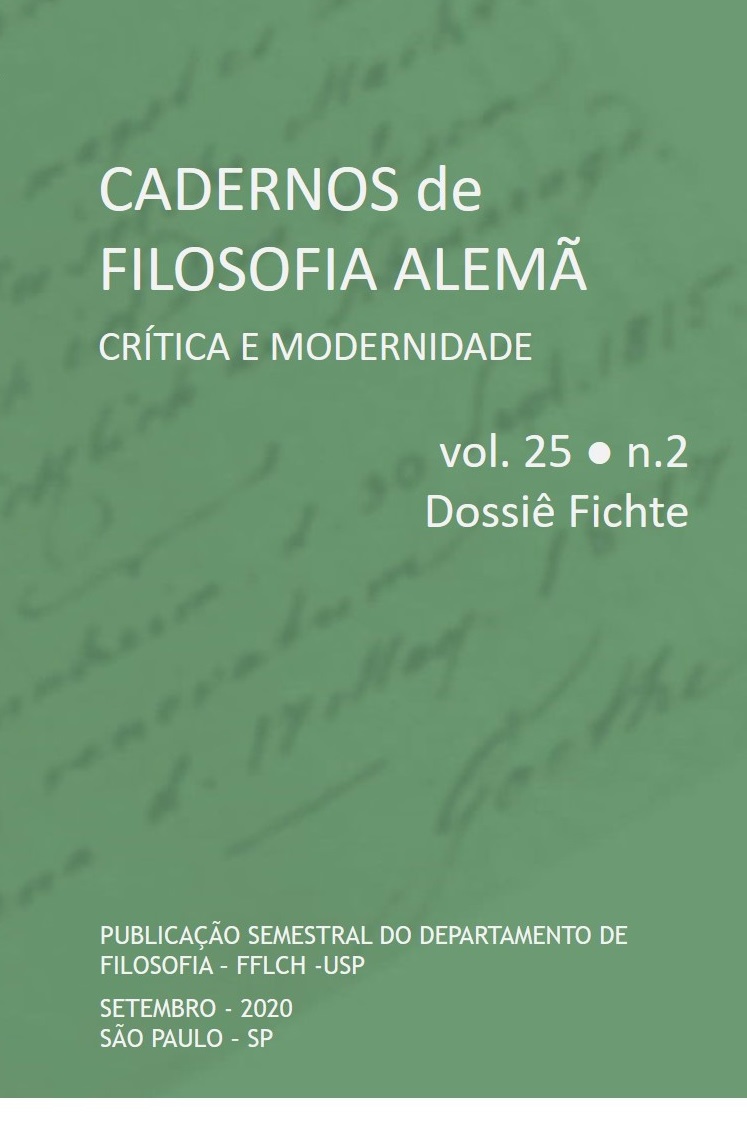The problem of education in Fichte's Staatslehre from 1813
DOI:
https://doi.org/10.11606/issn.2318-9800.v25i2p121-136Keywords:
Fichte, education, coercion, ethics, politicsAbstract
This paper addresses the doctrine of education in Fichte’s Staatslehre from 1813. I try to show that this theory is closely connected with Fichte’s idea of the relations between ethics and politics and with his idea of the transient character of the state. In fact, Fichte thinks that in a future world structured according to ethical principles, state power will be superfluous. But this implies an effort to educate people that only someone invested both with the supreme wisdom of the divine world order and the power of constraint will be able to carry through. If a reference to the role of the Zwingherr finds no place in Fichte’s 1813 a priori exposition of the philosophy of state, it has its due place in the 1812 exposition that takes into account the actual historical circumstances in which the doctrine is exposed. At the end, I examine some misinterpretations (according to my point of view) of Fichte’s philosophy of education and I stress, against Marc Maesschalk, the fact that the Fichtean project differs from Husserl’s idea of a community of autonomous and responsible transcendental subjects. For Fichte, the Zwingherr is someone who knows how far men are from being free and the extent to which they must be constrained in order to be so.
Downloads
References
Bazzan, M. R. (2019). «El enigma del Zwingherr». In: Ferrer, D. (coord.), A Filosofia da História e da Cultura em Fichte. Coimbra: Imprensa da Universidade, pp.241-257.
Druet, P.-P. (1974). La “politisation” de la métaphysique idéaliste: le cas de Fichte. Revue Philosophique de Louvain, 72(16), 678-712.
Fichte, J. G. (1845). Der Staatslehre. Sämtliche Werke (hrsg. von J. H. Fichte) Band IV. Berlin: Verlag von Veit und Comp., pp.369-600.
Fichte, J. G. (1985). Wissenchsftslehre 1804 / II. In: Gliwitzky, H. und Lauth, R. (hrsg.). J. G. Fichtes Gesamtausgabe Band II / 8. Stuttgart: Bad-Cannstatt.
Fichte, J. G. (1994). Wissenchsftslehre Nova Methodo. Hamburg: Felix Meiner.
Heine, H. (1834). De l´Allemagne depuis Luther. Revue des Deux Mondes, IV.
Husserl, E. (1959). Erste Philososphie. Zweiter Teil. Den Haag: Martinus Nijhoff.
Lauth, R. (1994). «L’action historique d’après la philosophie transcendantale de Fichte». In: Vernünftige Durchdringung der Wirklichkeit. Neuried: Ars Una, pp.373-406.
Maesschalck, M. (2006). «Introduction: Situation et enjeu de la Doctrine de l’État dans la dernière philosophie de Fichte». In : Fichte, J. G. La Doctrine de l’État. Paris: Vrin, pp.29-55.
Piché, C. (2003). «La doctrine de l’état et la question de l’éducation». In: Goddard, J.-Ch. et Maesschalck, M. (ed.). Fichte. La Philosophie de la Maturité (1804-1814). Paris: Vrin, pp.159-174.
Renaut, A . & Savidan, P. (2001). «As luzes críticas: Rousseau, Kant e Fichte». In : Renaut, A. História da Filosofia Política, 3. Lisboa: Instituto Piaget.
Downloads
Published
Issue
Section
License
Copyright (c) 2020 Carlos Aurélio Morujão

This work is licensed under a Creative Commons Attribution-NoDerivatives 4.0 International License.
Information and conceptions on the texts are complete responsibility of the authors.
All the articles submitted before July 5th 2018 and those published after July 2021 are licensed under a CC BY-NC-ND license – except those published between the aforementioned dates, which are under the CC BY-NC-SA license. The permission for the translation of the material published under the license CC BY-NC-ND by third parts can be obtained with the consent of the author.
Open access policies - Diadorim
Rules applied before July 5th 2018:
Presenting a submission to our Editorial Board implies granting priority of publication for “Cadernos de filosofia alemã”, as well as transferring the copyright of texts (once published), which will be reproduced only with the manifest authorization of the editors. Authors keep the right to reuse the texts published in future editions of their work, without paying any fees to "Cadernos”. We will not grant the permission to re-edit or translate the texts for third parts without agreement of the author.


